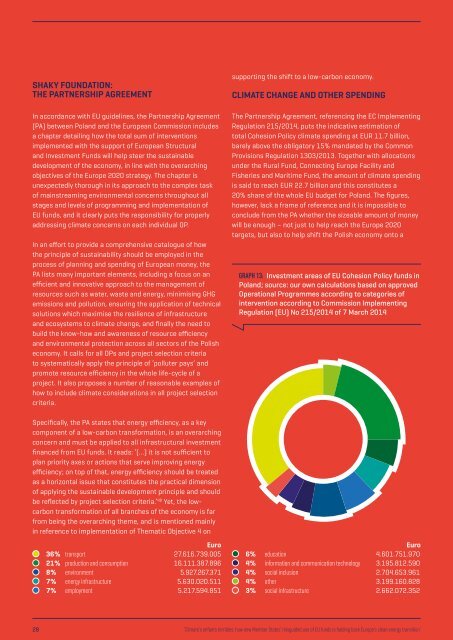ENFANTS TERRIBLES
enfants-terribles
enfants-terribles
You also want an ePaper? Increase the reach of your titles
YUMPU automatically turns print PDFs into web optimized ePapers that Google loves.
SHAKY FOUNDATION:<br />
THE PARTNERSHIP AGREEMENT<br />
In accordance with EU guidelines, the Partnership Agreement<br />
(PA) between Poland and the European Commission includes<br />
a chapter detailing how the total sum of interventions<br />
implemented with the support of European Structural<br />
and Investment Funds will help steer the sustainable<br />
development of the economy, in line with the overarching<br />
objectives of the Europe 2020 strategy. The chapter is<br />
unexpectedly thorough in its approach to the complex task<br />
of mainstreaming environmental concerns throughout all<br />
stages and levels of programming and implementation of<br />
EU funds, and it clearly puts the responsibility for properly<br />
addressing climate concerns on each individual OP.<br />
In an effort to provide a comprehensive catalogue of how<br />
the principle of sustainability should be employed in the<br />
process of planning and spending of European money, the<br />
PA lists many important elements, including a focus on an<br />
efficient and innovative approach to the management of<br />
resources such as water, waste and energy, minimising GHG<br />
emissions and pollution, ensuring the application of technical<br />
solutions which maximise the resilience of infrastructure<br />
and ecosystems to climate change, and finally the need to<br />
build the know-how and awareness of resource efficiency<br />
and environmental protection across all sectors of the Polish<br />
economy. It calls for all OPs and project selection criteria<br />
to systematically apply the principle of ‘polluter pays’ and<br />
promote resource efficiency in the whole life-cycle of a<br />
project. It also proposes a number of reasonable examples of<br />
how to include climate considerations in all project selection<br />
criteria.<br />
supporting the shift to a low-carbon economy.<br />
CLIMATE CHANGE AND OTHER SPENDING<br />
The Partnership Agreement, referencing the EC Implementing<br />
Regulation 215/2014, puts the indicative estimation of<br />
total Cohesion Policy climate spending at EUR 11.7 billion,<br />
barely above the obligatory 15% mandated by the Common<br />
Provisions Regulation 1303/2013. Together with allocations<br />
under the Rural Fund, Connecting Europe Facility and<br />
Fisheries and Maritime Fund, the amount of climate spending<br />
is said to reach EUR 22.7 billion and this constitutes a<br />
20% share of the whole EU budget for Poland. The figures,<br />
however, lack a frame of reference and it is impossible to<br />
conclude from the PA whether the sizeable amount of money<br />
will be enough – not just to help reach the Europe 2020<br />
targets, but also to help shift the Polish economy onto a<br />
GRAPH 13: Investment areas of EU Cohesion Policy funds in<br />
Poland; source: our own calculations based on approved<br />
Operational Programmes according to categories of<br />
intervention according to Commission Implementing<br />
Regulation (EU) No 215/2014 of 7 March 2014<br />
Specifically, the PA states that energy efficiency, as a key<br />
component of a low-carbon transformation, is an overarching<br />
concern and must be applied to all infrastructural investment<br />
financed from EU funds. It reads: ‘(…) it is not sufficient to<br />
plan priority axes or actions that serve improving energy<br />
efficiency; on top of that, energy efficiency should be treated<br />
as a horizontal issue that constitutes the practical dimension<br />
of applying the sustainable development principle and should<br />
be reflected by project selection criteria.’ 48 Yet, the lowcarbon<br />
transformation of all branches of the economy is far<br />
from being the overarching theme, and is mentioned mainly<br />
in reference to implementation of Thematic Objective 4 on<br />
Euro<br />
36% transport 27.616.739.005<br />
21% production and consumption 16.111.387.896<br />
8% environment 5.927.267.371<br />
7% energy infrastructure 5.630.020.511<br />
7% employment 5.217.594.851<br />
Euro<br />
6% education 4.601.751.970<br />
4% information and communication technology 3.195.812.590<br />
4% social inclusion 2.704.653.961<br />
4% other 3.199.160.828<br />
3% social infrastructure 2.662.072.352<br />
28<br />
‘Climate’s enfants terribles: how new Member States’ misguided use of EU funds is holding back Europe’s clean energy transition’


